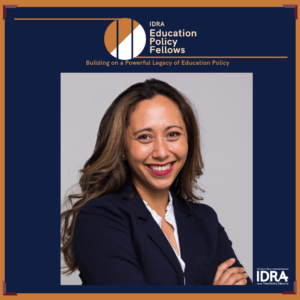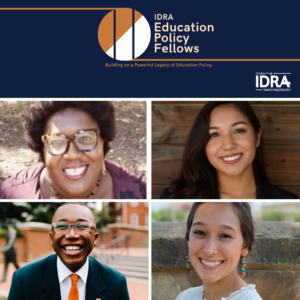 To ensure equitable education policies, advocates must play a key role in state-level policymaking. IDRA seeks to change the landscape of state education advocacy by training advocates with a commitment to and/or experience with communities of color to influence state laws and lead a powerful network of impacted communities.
To ensure equitable education policies, advocates must play a key role in state-level policymaking. IDRA seeks to change the landscape of state education advocacy by training advocates with a commitment to and/or experience with communities of color to influence state laws and lead a powerful network of impacted communities.
Sign up to receive our email updates!
The Problem
Education policy decisions are largely made and influenced by people who do not reflect the population of Texas’ and Georgia’s K-12 schools or institutions of higher education, the majority of whom are students of color. The state-level advocacy community has not adequately provided space to advocates with experience with communities of color and is missing their important expertise.
The Solution
State policymakers can make stronger education policy decisions by working with advocates who are connected to impacted communities, particularly people of color. IDRA’s fellows gain real-world advocacy experiences and training during the state’s legislative session, work with coalitions, students and families to craft a community-centered education policy agenda, and join a network of advocates and policy influencers focused on improving racial equity in education policymaking spaces.
For an analysis of how advocates could have a greater impact on policymaking, read Skin in the Game: The 86th Texas Legislative Session and Advocate Diversity by Morgan Craven, J.D., IDRA’s National Director of Policy, Advocacy and Community Engagement.
This is Why
We are experiencing a time when access to public pK-12 and higher education increasingly feels under threat. The pandemic has worsened existing inequities in college access and enrollment, and exacerbated challenges for students currently in school. Additionally, across the country, the efforts to restrict truthful conversations about equity, history, racism, and other forms of discrimination are impacting how students can learn in their schools and prepare for college.
The last legislative sessions in Texas, Georgia and states across the U.S. South ushered in harmful classroom censorship bills that will widen racial inequities in schools and policies designed to silence and stigmatize LGBTQ+ communities. Efforts to censor speech and thought are now at the doors of colleges and universities, threatening diversity and inclusion efforts that impact faculty recruitment and retention, hampering research, and attacking the academic freedom that is central to postsecondary institutions.
These policies and the many related restrictions adopted in local communities are designed to attack public education as an institution, and the diverse students and communities that attend our public schools.
IDRA’s Education Policy Fellows will continue the work against these harmful policies and push forward a community-centered vision for what safe, equitable and excellent schools look like for all students.
The next round of applications will open spring of 2024.
How You Can Help
To support IDRA’s Education Policy Fellows program, or to sponsor a fellow, please click the Donate button below or contact Morgan Craven, J.D., IDRA’s National Director of Policy, Advocacy and Community Engagement.
Trellis Foundation Announces $1M in Grants Supporting Higher Education Policy Fellowships
We are thrilled to share the December 2023 news that IDRA is among four advocacy nonprofits in Texas to receive grants from Trellis Foundation to support the participation of Texas college students and leaders from under-represented communities in policy fellowships programs. Trellis Foundation announced today $1 million in total awards to four advocacy nonprofits, including IDRA.
Meet IDRA’s Second Class of Education Policy Fellows
 The IDRA Education Policy Fellows Program‘s next class began in October 2022 for the Texas and Georgia legislative sessions in 2023. The IDRA fellowship program is generously supported by The William and Flora Hewlett Foundation and the Kresge Foundation. The program’s inaugural cycle in Texas operated in 2020-21 and in Georgia in 2021-22.
The IDRA Education Policy Fellows Program‘s next class began in October 2022 for the Texas and Georgia legislative sessions in 2023. The IDRA fellowship program is generously supported by The William and Flora Hewlett Foundation and the Kresge Foundation. The program’s inaugural cycle in Texas operated in 2020-21 and in Georgia in 2021-22.
Meet our fellows
Hear what they have to say in our series of Classnotes Podcast episodes:
- A Bright Future in Education Advocacy – Podcast Episode 238
- Advocates of Color and Community Power – Podcast Episode 236
- Learning from Latino and Multilingual Youth – Podcast Episode 235
- The Good, Bad and Ugly of Legislative Advocacy – Podcast Episode 234
Meet IDRA’s Inaugural Class of Education Policy Fellows
On November 2, 2020, IDRA began its first Education Policy Fellows Program. Four fellows gained real-world advocacy experience and training during the 2021 Texas legislative session, because we know state policymakers can make stronger education policy decisions by working with advocates who are connected to impacted communities, particularly people of color. See announcement.
The IDRA Education Policy Fellows Program moved in November 2021 to Georgia for the state’s legislative session in early 2022 (see announcement). The program’s inaugural cycle in Texas operated from November 2020 through July 2021. It was generously supported by The William and Flora Hewlett Foundation, the Trellis Foundation, the Kresge Foundation, and in partnership with the John Gardner Public Service Fellowship, facilitated by Stanford University’s Haas Center for Public Service.
 See post-fellowship evaluation report
See post-fellowship evaluation report
Meet our fellows
See profiles with fellowship products
Hear what they have to say in our series of Classnotes Podcast episodes:
- The Future of Education Advocacy and Being Pushy – #217
- Education Policy Fellows Get Things Done in the Suppression Session – #216
- An Inside Look at Advocating with Communities of Color – #215
- Education Advocacy Hinges on Community Collaboration – #214
- Uniting Community Voices in Georgia Policymaking – #225


